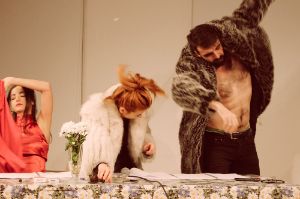Staged Reading | Stückemarkt
Der (vor)letzte Panda oder Die Statik / (Pret)posljednja panda ili statika
By Dino Pešut (Croatia)
German translation from the Croatian by Alida Bremer
Staged reading
Stückemarkt IV

© Uros Pajovic
Ana, Luka, Marin and Marija were born in Croatia in 1990. The play follows its characters for nearly thirty years and tells us how they behave and develop in varying economic, emotional and political contexts. The text joins polyphonous voices together – memories of childhoods in times of war pass into visions of future life conflicts. In doing so, it almost casually creates a precise typology of a young generation caught between two worlds.
Jury Statement
Having been born in Croatia in 1990 creates a connection. But what exactly is this connection and what remains of it? Memories of a childhood in wartimes, of aid parcels containing other children’s toys, of growing up in a (post-)socialist society, of unemployed parents, of the dream of living in Copenhagen one day? Dino Pešut’s play follows four characters for thirty years, coming of age in the transition from socialism to capitalism. Over the years, Ana, Luka, Marin, and Marija find themselves in increasingly different economic, emotional and political contexts. While Marin succeeds in the middle classes and builds a respectable life for himself in his native Croatia, Marija regresses into more and more conservative views there. Ana and Luka are united in a radical break with their old lives. They have both gone abroad, trying to redefine their identities and build careers beyond a bourgeois life-style. Almost imperceptibly, the characters’ shared memories become visions of future dilemmas – even if these are linked to very different questions. Whether to live in Berlin or in Paris? How to deal with a past life full of violence? How to live one’s own sexuality? How to get over many years of depression? How to go back and where to go – when back no longer exists. In telling, remembering and planning, time levels merge as if they had never been separated. The four characters’ points of view are un-hierarchical with regards to time, and their narration comes from a position that is distant from temporality. This causes their voices to flow together, forming a polyphonous narrative. This specific relationship to time automatically demands a specific mode of speaking and listening. The audience has to produce their own context of meaning and find their own perspective. We are not following the hopeless, collective account of a traumatized war generation. Rather, we are witnessing their many-voiced, energetic struggle to extricate themselves from a static situation. A struggle for their personal stories to provide meaning, which – just as in real life – leads to both failure and success. And so, almost casually, the account of many voices becomes the typology of a young generation. A generation caught between two worlds, who have lost their original space and are continually fighting for a new one – with an uncertain outcome. And yet, the hope for a better world remains.
Christina Zintl
Scenic arrangement Friederike Heller
Dramaturgy Sonja Anders
Scenography Maria Ebbinghaus
Cast
Marija Lisa Hrdina
Ana Luise Aschenbrenner
Marin Tilman Strauß
Luka Christoph Gawenda